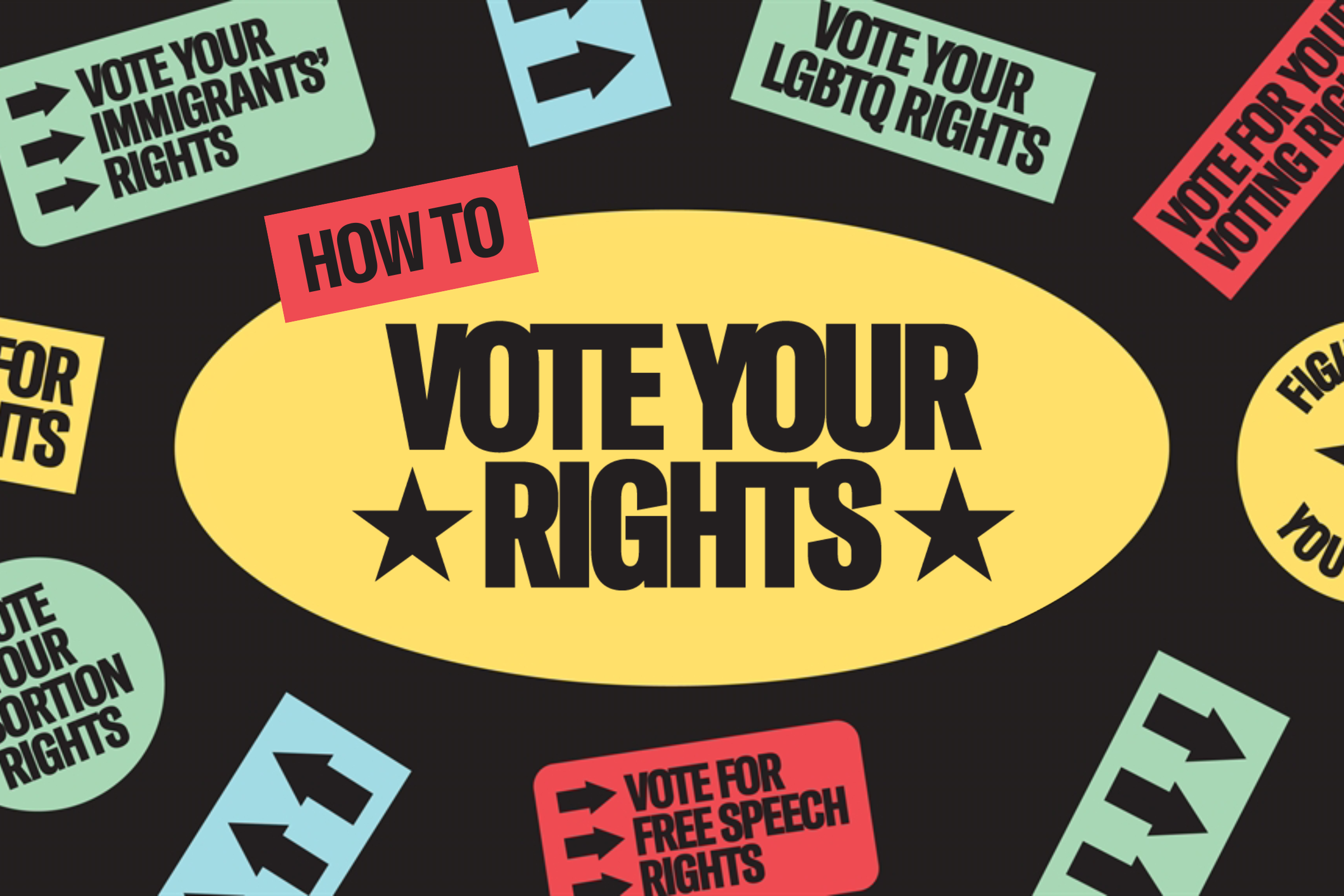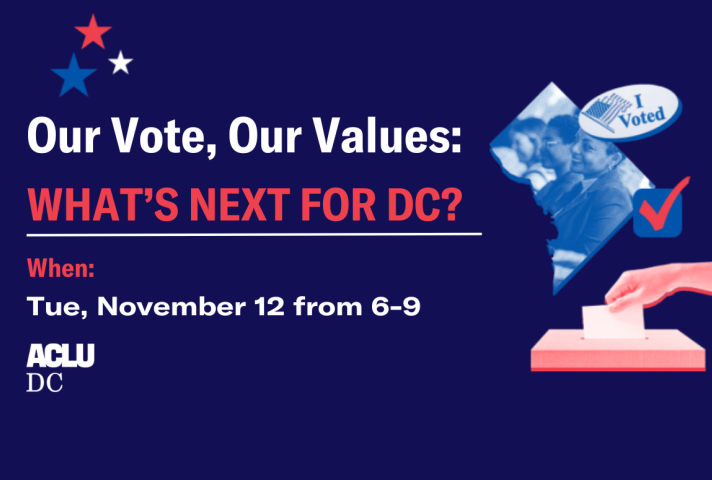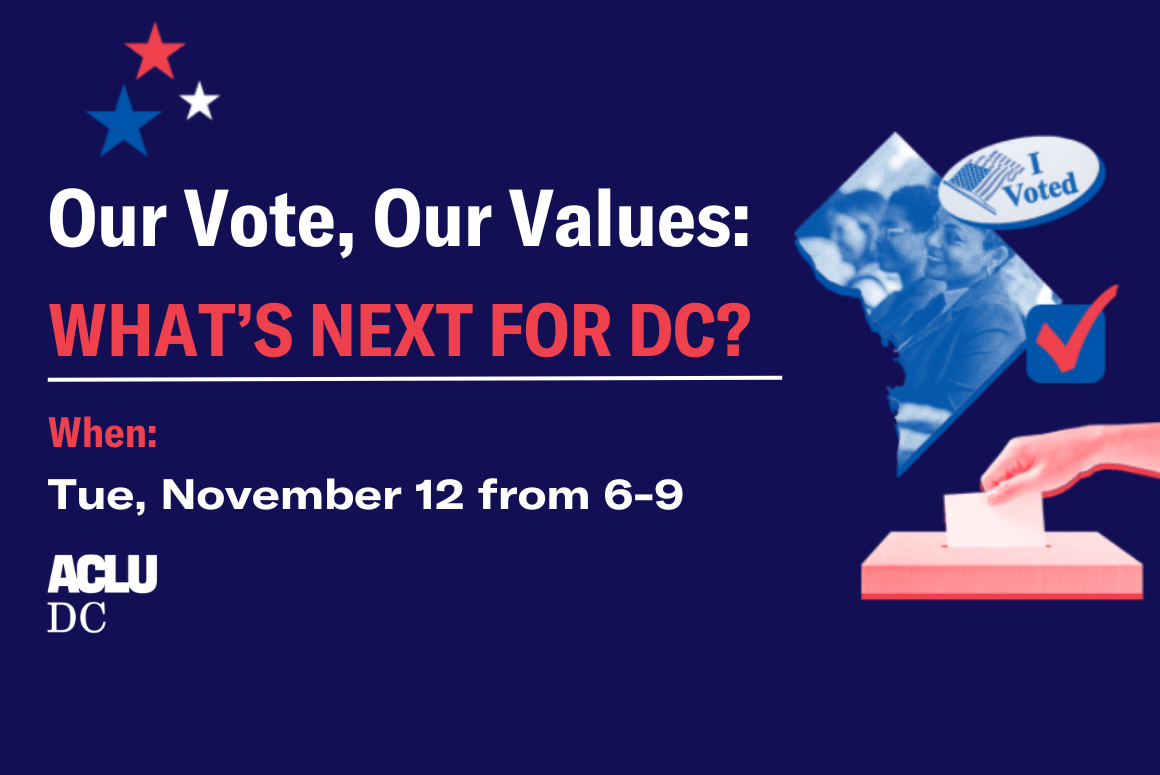This November, freedom is on the ballot. Voting is one of our most fundamental rights, and the general election is on November 5, 2024. At ACLU-D.C., we work to build a just and free D.C. where all people can exercise their civil rights and liberties. However you plan to vote, make civil rights and liberties a priority when you cast your ballot this November.
Here is everything you need to know to vote in the November 5 election: D.C. voter registration, polling locations, early voting, mail-in and drop-off ballots – we’ve got you covered.
REGISTER TO VOTE
Who can vote in the D.C. primary election?
D.C. residents who will be at least 18 years old by November 5, 2024 can vote in the general election.
Who can register to vote?
Both U.S. citizens and non-U.S. citizens can register to vote. To register, you must:
- be at least 17 years old (you can vote in the general election if you will be at least 18 years old by November 5, 2024);
- have claimed residency in the District of Columbia for at least 30 days immediately prior to the election;
- not claim residency or be registered to vote anywhere else;
- not have been found by a court to be legally incompetent to vote.
District residents who are U.S. citizens and 16 years old can pre-register to vote (but cannot vote in the primary election until the year they will turn 18 years old by general election day).
D.C. residents who are incarcerated may also register to vote, even if they are held outside the District. The District of Columbia Board of Elections is required to provide voter registration materials to D.C. residents incarcerated in the custody of the D.C. Department of Corrections and the Federal Bureau of Prisons.
Am I already registered to vote?
Check your voter registration status on the DC Board of Elections website.
If you are incarcerated, you can contact the DC Board of Elections at 202-727-2525 or via Corrlinks at [email protected] to confirm that your application was received.
How do I register to vote, update my registration, or change my party affiliation?
If you are a U.S. citizen, you can register to vote or update your registration by October 15 using one of these ways:
- online here;
- with a registration form. You can get a registration form online, at the DC Board of Elections office, or at most D.C. public libraries. Submit your completed form by mail (DC Board of Elections, 1015 Half St SE #750, Washington, DC 20003), in person, by fax (202-347-2648), or by email ([email protected]).
If you are not a U.S. citizen, you can register to vote or update your registration by October 15 using one of these ways:
- online here;
- with a registration form. You can get a registration form online, at the DC Board of Elections office, or at most D.C. public libraries. Submit your completed form by mail (DC Board of Elections, 1015 Half St SE #750, Washington, DC 20003), in person, by fax (202-347-2648), or by email ([email protected]).
If you miss the October 15 deadline, both U.S. citizens and non-citizens can register when you vote during early voting (October 28 – November 3) or on election day (November 5). Just bring proof of D.C. residency with you (see acceptable documents for citizens here and for non-citizens here) when you go to vote.
If you are incarcerated at the D.C. Jail, you can register to vote or update your registration using one of these ways:
- with a registration form by October 15. You can request a registration form by mail (DC Board of Elections, 1015 Half St SE #750, Washington, DC 20003). Submit your completed application by mail; the office must receive your application by October 15. Contact the DC Board of Elections at 202-727-2525 or via Corrlinks at [email protected] to confirm that your application was received.
- in person when you vote at the D.C. Jail.
- Same day registration is available at D.C. Jail on voting day(s).
If you are incarcerated at a Federal Bureau of Prisons facility, you can register to vote or update your registration:
- By contacting the DC Board of Elections at [email protected] via Corrlinks. Contact the DC Board of Elections at 202-727-2525 or via Corrlinks at [email protected] to confirm that your application was received.
People who are incarcerated and who have a disability that makes it hard to vote may email [email protected] or call collect at (202) 800-6190 to request accommodation.
LEARN ABOUT THE CANDIDATES
Candidates for both local and federal positions are on the ballot for the November 5 election, including U.S. President, At-Large D.C. Councilmembers, and non-partisan Advisory Neighborhood Commissioners.
Click here for a list of partisan federal and local candidates on the November 5 ballot.
Click here for a full list of non-partisan, hyper-local Advisory Neighborhood Commissioners (ANC) on the November 5 ballot. Click here to locate your ANC.
Though the ACLU doesn’t endorse or oppose candidates for elected office, we recognize there will be drastically different realities for the District, and the country, depending on who is elected. For example, because D.C. is not a state, the federal government is legally allowed to intervene in our local laws, budget, and public safety system. Donald Trump and his allies have threatened to take over D.C. An anti-D.C. federal government could ban abortion, stifle protest and free speech rights, allow dangerous police abuse, and trample our civil rights and liberties in other ways. In contrast, a Kamala Harris Administration and a pro-D.C. Congress could finally grant D.C. statehood. If Harris wins, we stand ready to work with her administration but also to push the administration to end suspicionless surveillance of Americans and to fully ban racial and other profiling, among other things.
Click here to find out where presidential candidates Kamala Harris and Donald Trump stand on D.C. Statehood and other critical issues affecting justice and freedom in the District and the nation.
This election is not just about who will be president — it’s about our freedom, our future and the trajectory of our democracy. At the ACLU, we’re prepared to use all of the tools at our disposal — litigation, legislation, advocacy, and grassroots mobilization — to ensure that our nation lives up to the promise of the Constitution no matter who wins.
LEARN ABOUT INITIATIVE 83
This election, D.C. residents can vote on Initiative 83. If passed, this ballot initiative would make two changes to voting in D.C.: 1) it would allow Independents to vote in D.C. primaries, and 2) it would establish ranked-choice voting in D.C. in 2026.
If passed, Initiative 83 would allow Independents to vote in one primary election of their choice – Democratic, Republican, or DC Statehood Green. It would also allow voters to rank up to five candidates, from their most to least preferred. The candidate or candidates who win over 50% of ranked-choice votes would win. Note: This Initiative will not be implemented unless the D.C. Council separately chooses to appropriate funds for the projected costs.
Learn more about Initiative 83 here.
VOTE
This general election, you can vote by mail, dropbox, or in-person during early voting (October 28 – November 3) or on election day (November 5).
Vote by mail
All active registered D.C. voters and incarcerated voters who have registered to vote will receive a ballot in the mail. You can track your ballot here.
Complete and sign your ballot (instructions here) and then mail it (paid postage is included) by November 5. The ballot must be postmarked or have some other proof you mailed it by November 5, and it must arrive by November 15. You can contact the DC Board of Elections at 202-727-2525 (or if incarcerated, via Corrlinks at [email protected]) to confirm that your ballot was received.
Vote by dropbox
All active registered D.C. voters will receive a ballot in the mail. You can track your ballot here. Dropboxes open on October 11. Complete and sign your ballot (instructions here), and then drop it in a dropbox (locations here) by 8:00p.m. on November 5.
Vote early in person (October 28 – November 3, 8:30a.m.–7:00p.m.)
Go to an Early Vote Center (locations here) between 8:30a.m.–7:00p.m. to vote by paper or electronic ballot.
You don’t need to bring any specific form of ID to vote early in person, but if you are doing same day voter registration, bring proof of D.C. residency with you (see acceptable documents for citizens here and for non-citizens here).
If you are incarcerated at the D.C. Jail, you can vote in person at the D.C. Jail between October 29-31. Voting at the D.C. Jail does not happen on election day.
Vote in person on election day (November 5, 7:00a.m.–8:00p.m.)
Go to any Vote Center (locations here) regardless of your address between 7:00a.m.–8:00p.m. to vote by paper or electronic ballot.
You don’t need to bring any specific form of ID to vote in person on election day, but if you are doing same day voter registration, bring proof of D.C. residency with you (see acceptable documents for citizens here and for non-citizens here).
Date
Thursday, October 17, 2024 - 12:00amFeatured image





